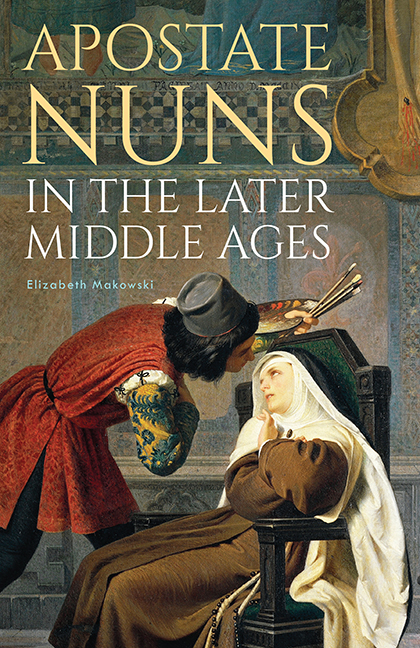Summary
This book is about women who had taken vows to live as nuns and who had, without canonical dispensation, abandoned their cloister to return to secular life. It explores the way in which the developed canon law, incorporating principles articulated in the earliest monastic literature, sought to ensure adherence to religious vows, and how the resulting legal formulations impacted the lives of these female apostates. It spans the period from about 1300 to 1540, with both dates being significant.
By c.1300, virtually all the major papal and conciliar legislation that would guide decision-making about religious life for the next two centuries, and much longer in the Roman Catholic Church, had been codified. Like so many other areas of Church discipline – from marriage law to the annual sacramental obligations of the laity – efforts to standardize monastic practice, especially the requirements for admission to an accepted order, began in earnest in the mid-twelfth century. From the time of Gratian's Decretum, the process of systemization and rationalization of canon law, the efforts to harmonize conflicting ecclesiastical authorities and custom, continued apace. Academic commentary on the resulting law would continue into the fourteenth and fifteenth centuries and it would guide jurists in coming to decisions on a case-by-case basis. Publication of the principal books that would constitute the Corpus Iuris Canonici however, signaled the conclusion of this classical, innovative age of canonical achievement.
In conjunction with the trend to ensure uniformity of monastic practice generally – evidenced in legislation like the Fourth Lateran Council's decree (1215) banning the proliferation of new orders and Boniface VIII's vaunted effort (1298) to impose strict enclosure upon “all nuns of every order throughout Christendom” – rules for the recognition, return, and reintegration of apostate regulars were also established. By the close of the thirteenth century, standardized norms had superseded (or as the canonists said, rationalized) more opaque, various, and sometimes conflicting general counsels and directives. The cases covered here were adjudicated according to these canonical norms; the petitions and appeals that these women filed, the dispensations they were granted, and even the narratives about their penitent return and reentry into community all reflect these norms.
- Type
- Chapter
- Information
- Apostate Nuns in the Later Middle Ages , pp. vii - xPublisher: Boydell & BrewerPrint publication year: 2019

